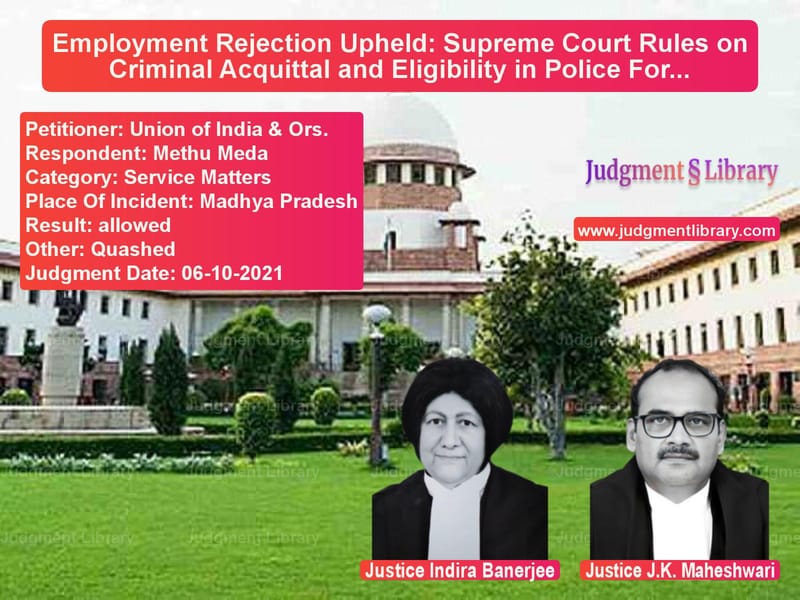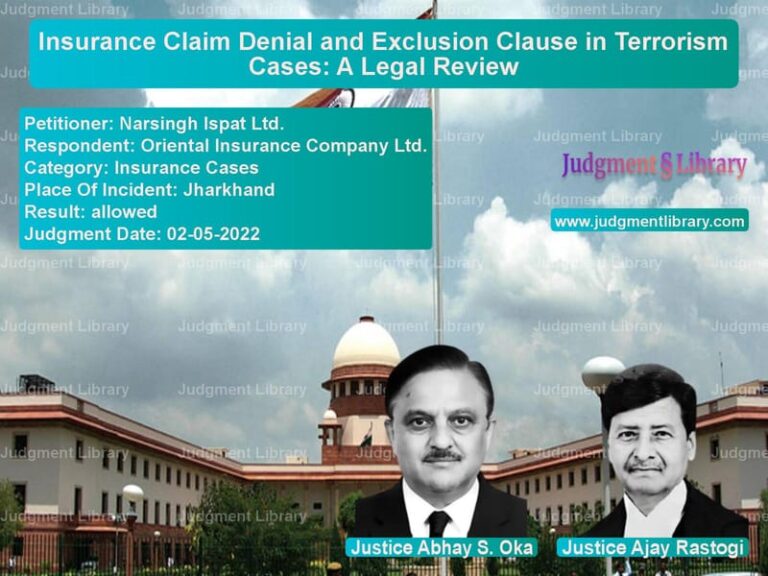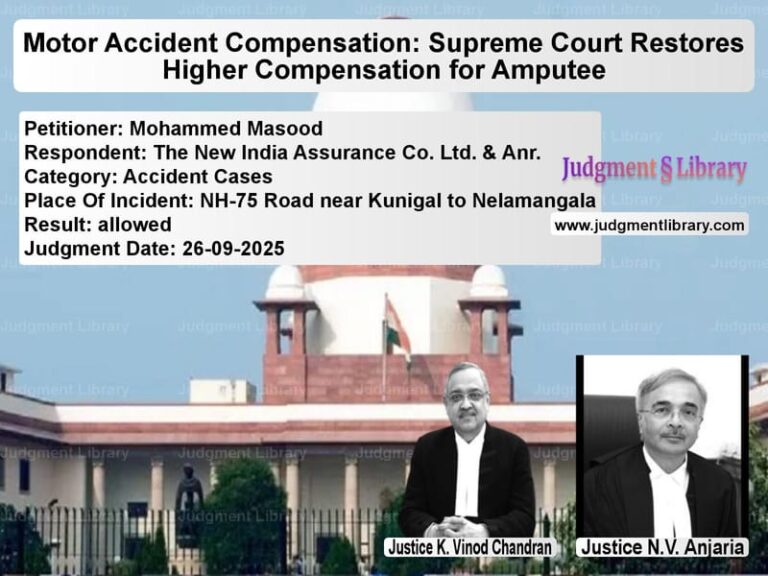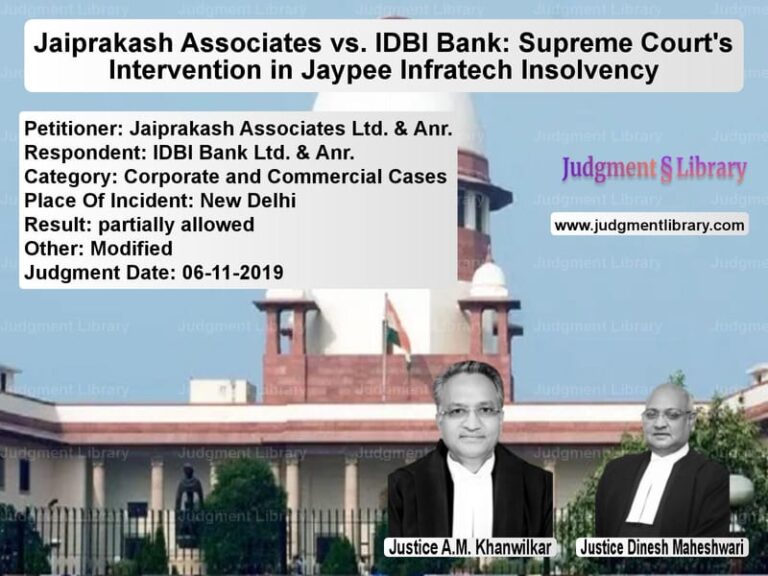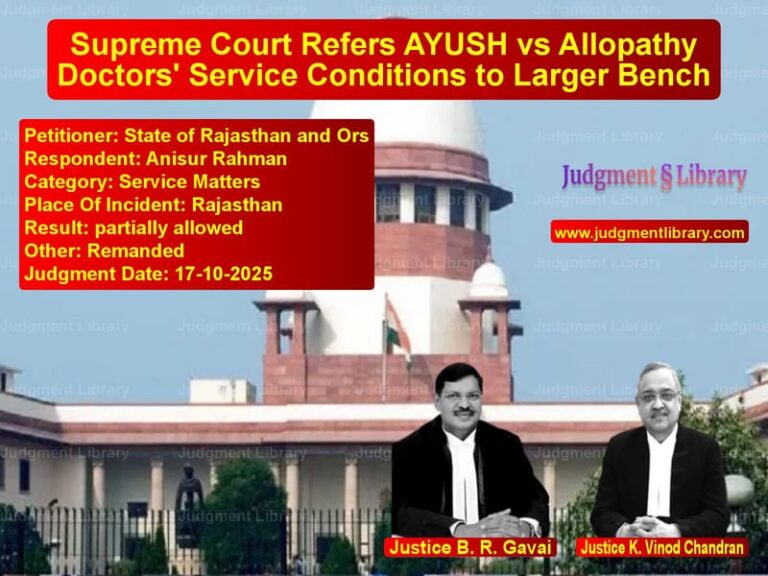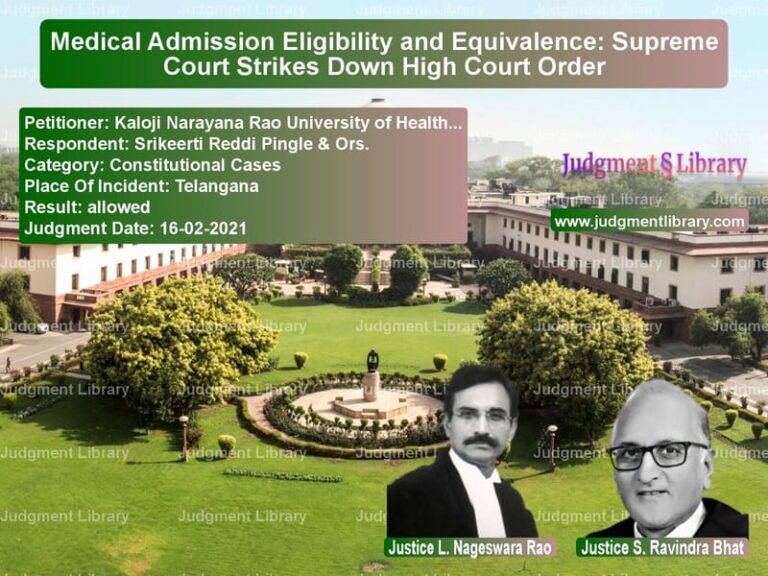Employment Rejection Upheld: Supreme Court Rules on Criminal Acquittal and Eligibility in Police Forces
The Supreme Court of India, in the case of Union of India & Ors. vs. Methu Meda, examined the legal principle governing the appointment of individuals with prior criminal records to disciplined forces such as the Central Industrial Security Force (CISF). The ruling reaffirms that mere acquittal in a criminal case does not guarantee eligibility for government employment, especially in security forces where integrity and character are paramount.
Background of the Case
The respondent, Methu Meda, applied for the post of Constable in CISF through the Staff Selection Commission (SSC). He was selected and received a provisional appointment offer on March 30, 2012, subject to background verification. During the verification process, he disclosed that he had faced criminal charges under Sections 347, 327, 323, 506(Part-II), and 364A of the Indian Penal Code (IPC) related to kidnapping for ransom.
The Sessions Court acquitted him of all charges on March 19, 2010, primarily because the key witnesses, including the complainant, turned hostile.
Decision of the Screening Committee
Despite his acquittal, a Standing Screening Committee reviewed his case and declared him ineligible for appointment in CISF on October 15, 2012. The decision was based on guidelines issued by the Ministry of Home Affairs and a circular from CISF, stating that candidates involved in serious offenses should not be appointed unless they were honorably acquitted.
Read also: https://judgmentlibrary.com/supreme-court-upholds-bar-councils-decision-in-lawyer-misconduct-case/
Legal Challenge
Methu Meda challenged the decision in the Madhya Pradesh High Court, which ruled in his favor, directing CISF to allow him to join training. The Division Bench upheld this order, leading the Union of India to appeal before the Supreme Court.
Arguments Presented
Union of India’s Arguments:
- The respondent was acquitted due to witnesses turning hostile, not because of a finding of innocence.
- Employment in a disciplined force requires impeccable character, and individuals with prior involvement in serious crimes pose a risk.
- The Screening Committee’s decision was lawful and aligned with the Supreme Court’s past rulings.
Respondent’s Arguments:
- He had truthfully disclosed his prior case in the attestation form.
- The High Court rightly held that acquittal should be sufficient to allow him employment.
- Other candidates in similar circumstances had been appointed.
Supreme Court’s Ruling
The Supreme Court set aside the High Court’s order, upholding the CISF’s decision to reject the respondent’s candidature. The Court made the following key observations:
On the Nature of Acquittal:
The Court distinguished between “honorable acquittal” and acquittal due to lack of evidence or hostile witnesses. It cited precedents stating:
“If acquittal is based on witnesses turning hostile or technical grounds, the employer has the right to consider whether the candidate is suitable for employment.”
On the Right of the Employer:
- The employer has discretion to assess the suitability of a candidate based on antecedents.
- Acquittal does not automatically entitle a candidate to a government job.
- Security forces require a higher standard of integrity and moral conduct.
On Public Trust in the Police Force:
The Court emphasized that law enforcement agencies must ensure that officers have a clean record, as their credibility impacts public trust.
“The police force is responsible for maintaining law and order. A person with prior criminal involvement, even if acquitted, may erode public trust in the system.”
Precedents Considered
The judgment cited several important cases, including:
- Avtar Singh vs. Union of India (2016) – The employer has discretion in assessing a candidate’s criminal history.
- Commissioner of Police vs. Mehar Singh (2013) – Acquittal by granting benefit of doubt does not mean a candidate is suitable for employment.
- State of Rajasthan vs. Love Kush Meena (2021) – Candidates for disciplined forces must have impeccable character.
Conclusion
The Supreme Court’s judgment clarifies that:
- Acquittal alone does not confer a right to government employment.
- Employers, especially in security forces, can reject candidates based on past criminal charges.
- Only an “honorable acquittal” can ensure a clean slate for the candidate.
The ruling strengthens the integrity of recruitment processes in law enforcement and ensures that individuals with questionable pasts do not enter disciplined forces.
Petitioner Name: Union of India & Ors..Respondent Name: Methu Meda.Judgment By: Justice Indira Banerjee, Justice J.K. Maheshwari.Place Of Incident: Madhya Pradesh.Judgment Date: 06-10-2021.
Don’t miss out on the full details! Download the complete judgment in PDF format below and gain valuable insights instantly!
Download Judgment: union-of-india-&-ors-vs-methu-meda-supreme-court-of-india-judgment-dated-06-10-2021.pdf
Directly Download Judgment: Directly download this Judgment
See all petitions in Recruitment Policies
See all petitions in Public Sector Employees
See all petitions in Employment Disputes
See all petitions in Judgment by Indira Banerjee
See all petitions in Judgment by J.K. Maheshwari
See all petitions in allowed
See all petitions in Quashed
See all petitions in supreme court of India judgments October 2021
See all petitions in 2021 judgments
See all posts in Service Matters Category
See all allowed petitions in Service Matters Category
See all Dismissed petitions in Service Matters Category
See all partially allowed petitions in Service Matters Category

